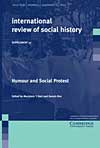Volume 52 supplement 15 (2007)
Contents

Humor and Social Protest
Edited by Marjolein 't Hart and Dennis Bos
Humour and laughter are intriguing aspects of social life, and as a result the study of humour has bloomed as an interdisciplinary subject field. Among the many social functions it can have, humour can act as a powerful tool in social protest. This volume explores this role by bringing together a varied collection of examples. Combining recent developments in the field of social movement theory regarding framing, collective identity, and emotions with insights from humorology, the seventeen essays in this volume show the power of humour in framing social and political protest. The authors explore under what conditions laughter can serve the cause of the protesters; how humour has strengthened social protest; to what degree humour has been an effective tool for contentious social movements; and how humour can further the development of the collective identity of a social movement, whereas in several cases humour acted as a powerful communication tool, serving as a true ''weapon of the weak''. The essays deal with a broad variety of historical and spatial settings, in quite different political opportunity structures, from open democratic societies to harsh repressive regimes, from the Zapatistas in Mexico to Vietnamese garment workers, from sixteenthcentury Augsburg to Madrid and Stockholm in the 1990s.
Articles
Marjolein 't Hart Humor and Social Protest, an introduction [summary]
Humor, Framing and Resource Mobilization
Thomas Olesen The Funny Side of Globalization: Humor and Humanity in Zapatista Framing [summary]
Michael Cohen "Cartooning Capitalism". Radical Cartooning and the Making of American Popular Radicalism in the Early Twentieth Century [summary]
Nicola Pizzolato Revolution in a Comic Strip: Gasparazzo and the Identity of the Southern Migrants in Turin, 1969-1975 [summary]
Satire, Protest and the Public Sphere
Christian Kuhn Urban Laughter as a "Counter-Public" Sphere in Augsburg: The Case of the City Mayor Jakob Herbrot (1490/95-1564) [summary]
Sammy Basu "A Little Discourse Pro & Con": Levelling Laughter and Its Puritan Criticism [summary]
Simon Teune Humour as a Guerrilla Tactic. The West German Student Movement's Mockery of the Establishment [summary]
Carnival Laughter and the Disarming of the Opponent
Lisiunia A. Romanienko Antagonism, Absurdity, and the Avant-garde: Dismantling Soviet Oppression through the Use of Theatrical Devices by Poland's 'Orange' Solidarity Movement [summary]
Patrick Gun Cuninghame "A Laughter That Will Bury You All": Irony as Protest and Language as Struggle in the Italian 1977 Movement [summary]
Anna Lundberg Queering Laughter in the Stockholm Pride Parade [summary]
Humor and the Building of the Collective Identity in Social Movements
Kirsti Salmi-Niklander Bitter Memories and Broken Soap Bubbles: Irony , Parody and Satire in the Oral-Literary Tradition of Finnish Working-Class Youth at the Beginning of the Twentieth Century [summary]
Nghiem Lien Huong Jokes in a Garment Workshop in Hanoi: How does Humor Foster the Perception of Community in Social Movements? [summary]
Nathan Wise Fighting a Different Enemy: Social Protests against Authority in the Australian Imperial Force During the First World War [summary]
Cristina Flesher Fominaya The Role of Humor in the Process of Collective Identity Formation in Autonomous Social Movement Groups in Contemporary Madrid [summary]
Jokes, Social Protest and the Wider Society
Krista Cowman "Doing something silly". The Uses of Humour by the Women's Social and Political Union, 1903 - 1914 [summary]
Patrick Merziger Humour in Nazi Germany: Resistance and Propaganda? The Popular Desire for an All Embracing Laughter [summary]
Christie Davies Humour and Protest: Jokes under Communism [summary]
